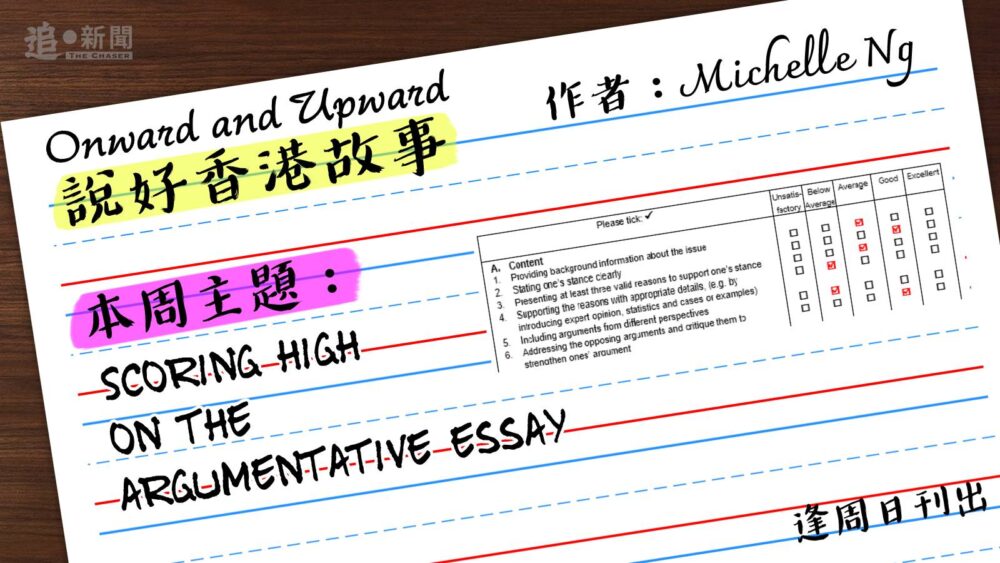
“You know the meaning of ‘dull as dishwater’?” I asked a writing student the other day.
I was using “dull as dishwater” to characterize many of the argumentative essay topics English teachers routinely assign. It’s not exactly their fault: students have to tackle this kind of writing questions in public exams, so teachers have to make sure their charges know the drill.
報道無罪 知情有價 請即訂閱《追新聞》:
https://www.patreon.com/thechasernews
The process of getting a hang of the argumentative essay need not be dull as dishwater, though. The ability to charm our readers is a crucial life skill: long after we leave school, we are still writing “argumentative essays” when we do things like communicating in print with prospective employers and clients. So, since the argumentative essay is an inescapable part of school life, why not seize on it as a chance to learn how to write in an engaging tone?
This know-how can make a world of difference, as demonstrated by the following contrast between a student’s argumentative essay – I’ve only included her introduction – and my rewrite of it.
Student’s version
We frequently hear about global warming in the news. It is true that we tend to do whatever we want. For instance, we keep on using plastic bags and don’t cut down on electricity usage. Have we considered how our acts will affect other living things?
An increase in greenhouse gases will lead to warmer temperatures. Such harmful fumes are emitted by factories and they bring negative long term consequences. Animal habitats are destroyed and so animals are forced to migrate. This causes the population of animals to decrea
My rewrite
When an Artic tour guide posted on her Facebook a photo she had taken of a dull-eyed polar bear so undernourished that his entire skeleton was visible through his skin, environmental groups lost no time in using the creature to compel us to connect the dots: indulge in the habit of tossing plastic bags into the bin, and we’ll set off a chain of reaction that will eventually condemn his kind to such a sorry existence.
Indeed, facts about climate change have become so commonly known by now that we can work out the reasons behind the polar bear’s plight ourselves. After the amount of carbon monoxide produced by the burning of plastic reaches a certain threshold, the earth’s temperature will rise. This will in turn cause ice to melt. Polar bears hunt for food on ice; a shrinkage in ice floats will therefore reduce their prey-finding channels. For them, and for so many other species, global warming is a death sentence.
The student’s copy is free of grammatical errors, yet it won’t get a high score because it is, well, dull as dishwater. I animated her content by using the polar bear as an illustration and by connecting all the elements, so that each sentence “flows” naturally from the last. If students approach writing the way I do – seeing it as very much a matter of training the mind to constantly look for links – then writing will have more or less the same fun quotient as playing crossword puzzles!
Michelle Ng
英國牛津大學畢業,前《蘋果日報》和《眾新聞》專欄作家,現在身在楓葉國,心繫中國大陸和香港。
聯絡方式: michelleng.coach@proton.me
個人網站: https://michellengwritings.com
逢周日英國時間晚上8時 / 周一香港時間凌晨4時刊出
《追新聞》無金主,只有您!為訂戶提供驚喜優惠,好讓大家支持本平台,再撐埋黃店。香港訂戶可分享給英國親友使用。



